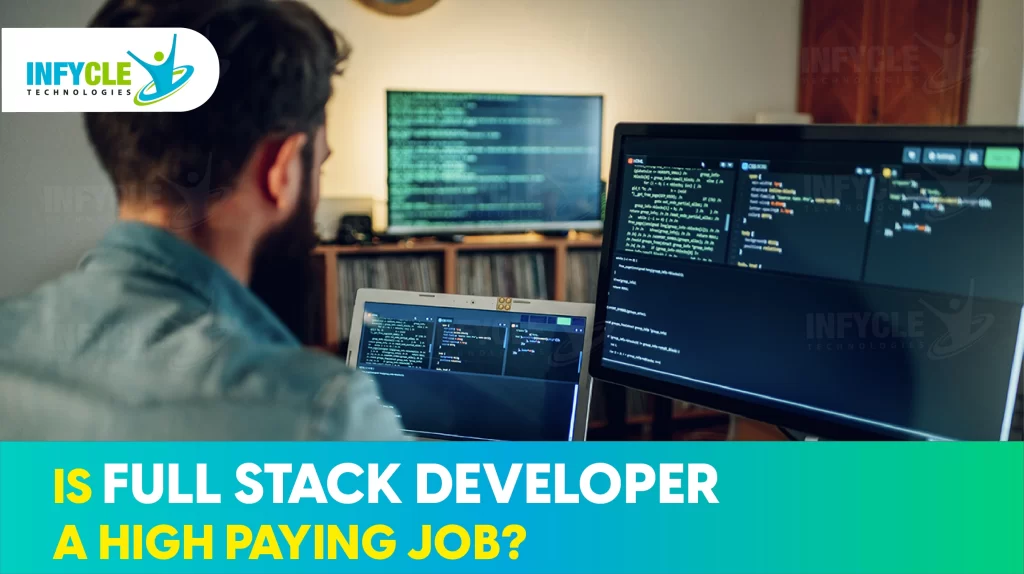Is Full Stack Developer A High Paying Job?
Do you want to pursue a career in technology but are unsure about the path to take? One possibility, though, is to work as a Full-Stack Developer, which is both promising and profitable. It’s a position with excellent career opportunities and a competitive income, but certain important elements will determine how much you can make.
This article will break things down for you. We’ll start by outlining the roles and responsibilities of a Full Stack Developer and how you can learn to become one. After that, we’ll go into further detail about the potential income in this fascinating industry. So, let’s begin our exploration of the field of Full-Stack Development!
What Does Full-Stack Development Actually Mean?
A website typically has two components: the front end (client-side) and the back end (server-side). The front end, which comprises HTML, CSS, and additional languages like Javascript, is what appears when you visit a website. Although web designers often handle the more artistic aspects, developing the front end requires balancing both functionality and beauty.
In terms of the backend, this refers to all of the activities occurring quietly in the background. Many different languages, like PHP, Ruby, and Python, and numerous frameworks combine with them, but backend developers typically focus on just some of them. Several backend developers are also in charge of handling the database and troubleshooting potential server-side problems.
So, how do full-stack developers fit into this? They are experts in everything. A full-stack developer can handle issues on both the client and server sides and can set up a functional website by themselves. Full-stack development is a less specialised position, but it indicates that you have experience with all phases of web development. Becoming a full-stack developer has several benefits because it allows you to be very adaptable and work on various aspects of a project as needed.
Roles and Responsibilities of Full Stack Developers
Full-Stack developers are flexible and trained professionals who are in charge of both the frontend and backend components of web development. On the front end, they employ JavaScript, HTML, and CSS to build user interfaces (UI) and maintain a consistent user experience (UX). Their backend activities consist of creating server-side logic, handling databases, and setting up web servers. It is necessary to be proficient in various programming languages and frameworks, including Python, JavaScript, React, Node.js, and others.
Troubleshooting and debugging code issues, working across departments, and effective communication are all part of their responsibilities. In order to keep up with changing technology and market trends, full-stack developers regularly update their skill sets. They handle work management, set deadline priorities, and adjust to evolving requirements to guarantee effective project completion. They must also be vitally concerned with security deployment, scalability optimisation, and testing-based quality assurance.
These experts bridge the gap between backend and frontend development, making them essential in creating and maintaining web applications. Their adaptability, problem-solving skills, and understanding of the entire development process contribute to the success of web projects.
Why Full Stack Developers Are In Demand In India?
The list of factors is as follows:
Increasing Demand
The need for full-stack developers is skyrocketing. Businesses across all sectors, from startups to large multinational enterprises, are searching for full-stack developers. A full-stack developer consistently outperforms specialists specialising in just one or two tasks, increasing business demand.
Growth Environments
The industry’s enormous growth possibilities are driving up the need for full-stack developers. A prominent feature of the sectors facing an increase in demand correlates with the expansion of startup culture globally.
Rising Career Possibilities
Companies, especially startups with ongoing financial routines, prefer to hire full-stack professionals instead of employing two developers (one for the front-end and the other for the back-end) because of the tremendous profits associated with doing so.
Inadequate Workforce
Full stack developers are in high demand due to a lack of qualified candidates because they have a variety of skills that allow them to perform a variety of responsibilities effectively. In a competitive job market, their capacity to fill skill shortages, expedite projects, and adjust to shifting demands makes them attractive assets.
Average Full Stack Developer Salary In India
In India, the full stack developer salary has improved recently. A full stack developer’s income could differ from city to city. A few more factors might affect the full-stack developer’s salary, including the applicant’s skill set, experience, education, location, and job title. In India, the average salary for a full stack developer is ₹6,77,000, but it can increase if the student has adequate expertise or comes from a top college like IIT or NIT.
Salary Based On Skills
The salary of a full-stack developer is significantly influenced by the specific skills you have been trained in. The qualitative component is simply as important as the quantity. The full-stack developer salary in India is based on a variety of elements, all of which fall under the area of skill set.
Here is the average salary according to skill level:
JavaScript With Full Stack Developer – ₹6,00,000 per annum
Python with Full Stack Developer – ₹5,48,666 per annum
Node JS with Full Stack Developer – ₹5,40,000 per annum
Salary Based On Location
Different leading corporations in India have their headquarters in cities like Hyderabad, Chennai, Bangalore, and Delhi. This factor has a substantial impact on full-stack developer salaries in these cities.
The following are the average salaries based on location.
Mumbai – ₹5,90,000 per annum
Bangalore – ₹8,60,000 per annum
Chennai – ₹8,00,000 per annum
Hyderabad – ₹8,30,000 per annum
Salary Based On experience
Your level of experience has a big impact on your income. Having significant experience with a renowned organisation puts you ahead of many potential employers.
Below are the average salaries of full-stack developers in India based on their experience:
Freshers – INR 1.8 lakhs per annum
Upto to 7 years – INR 8.7 lakhs per annum
10 to 20 years – INR 20.4 lakhs per annum
Salary Based on Company
According to hiring limits and ideologies, Indian companies pay full-stack developers at a variety of levels.
Here is a list of the top recruiters in India, along with a breakdown of their base pay ranges.
Tata Consultancy Services – INR 5,50,000 per annum
IBM – INR 11,50,000 per annum
Infosys – INR 5,50,000 per annum
Wipro – INR 7,10,000 per annum
How Infycle Technologies Helps You to Become a Full Stack Developer?
With Infycle Technologies, you can become a capable Full stack developer through their full stack developer course in Chennai. They educate students in a variety of critical skills, such as how to work with databases, frameworks, and both the frontend and backend components of websites. Practical tasks are included in the course to help you put what you’ve learned into practice.
Skilled trainers carefully supervise your entire growth process and ensure you understand the theory and how to use it in real world situations. Infycle Technologies prepares you for a fulfilling career in the sector by providing you with all the knowledge and skills required to excel as a Full stack developer in the constantly evolving IT industry.
If you’re interested in full stack development, check out A Detailed Roadmap to Be a Full Stack Developer in 2023.
Conclusion
Full stack developers have great opportunities in India right now. This trend incorporates the increase in full stack developer salaries in India.
Hopefully, you now better understand full stack developer salaries in India. These figures are only estimates. Ultimately, how much you earn depends on the skills you possess, the mastery you have achieved over them, and how fast you can grow with the company.





